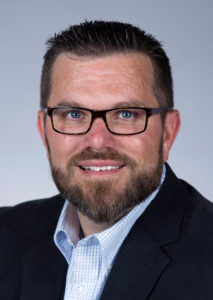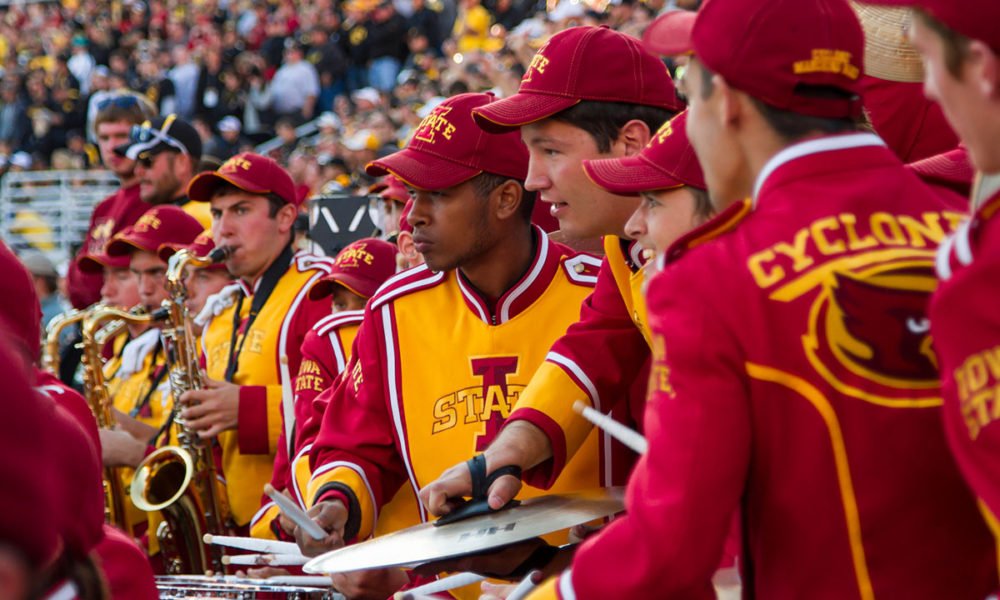And the 2017 Sudler Trophy goes to … Iowa State University. Dr. Steven Smyth discusses the Cyclone Marching Band’s unique makeup and its latest achievement.
 If anything could make winning the “Heisman Trophy for Bands” more exciting, it’s winning as director at your alma mater. Iowa State University’s Dr. Steven Smyth experienced that honor last December when his Cyclone Marching Band received the 2017 Sudler Trophy. The biannual award recognizes the “outstanding contribution of college marching bands to the American way of life.”
If anything could make winning the “Heisman Trophy for Bands” more exciting, it’s winning as director at your alma mater. Iowa State University’s Dr. Steven Smyth experienced that honor last December when his Cyclone Marching Band received the 2017 Sudler Trophy. The biannual award recognizes the “outstanding contribution of college marching bands to the American way of life.”
Halftime: What is your musical background?
Smyth: I’m a percussionist. I have an undergraduate degree from Iowa State and then a Master’s from Oklahoma State and a Doctorate from the University of Kansas. I taught high school for five years, then went on and taught at the University of Central Arkansas for five years, and I am in my sixth year here.
Halftime: How did it feel to win the Sudler Trophy?
Smyth: It was a huge honor to be amongst all those other great bands and to have our name put alongside them. Not only am I really proud as the director, but I’m an alum too, so it’s kind of fun to come home to my alma mater and be able to be the director as we receive that award.
Halftime: What does this honor mean for the Iowa State program?
Smyth: It’s really good for us. You know, we have a unique program. While we are a Division I school in the Big 12, we haven’t traditionally had a lot of football success. So our visibility isn’t quite as high with our football program. But it’s just kind of a testament to the quality and dedication of our students that we were able to get this award without necessarily having a really strong football tradition.
Halftime: How did your students react?
Smyth: It was shocking. When I got this job, it was always a goal. It’s not a goal you could work toward because you have to be nominated, and it’s not a process we really have control over. But when we got nominated, I told the band, and they were all excited. We were just happy to be within that company. And then as the process continued, and the amount of bands nominated narrowed down with the selection process, we were just honored beyond belief. And then when we actually got the award itself, we were just so darn surprised. It was a really great thing for us.
Halftime: What do you love about the Cyclone Marching Band?
 Smyth: Iowa State is a technology school. We are not a large music school. We have a small music department. And out of 360-some members, I think only 10 are music majors, and we have 180 engineers. So this ensemble has kind of a special place within the university just because of the makeup. It’s mostly non-majors, and there are no scholarships within the band. These are students who want to be here and who value the experience and value music.
Smyth: Iowa State is a technology school. We are not a large music school. We have a small music department. And out of 360-some members, I think only 10 are music majors, and we have 180 engineers. So this ensemble has kind of a special place within the university just because of the makeup. It’s mostly non-majors, and there are no scholarships within the band. These are students who want to be here and who value the experience and value music.
I think the best thing for us is the Cyclone community. We call it Cyclone Nation. We get so much support from athletics; we get so much donor support from our alumni. We are one of the few bands that is not suffering for funding or support. And to see our alumni, who are so proud. We’re usually around 300-plus who come back for alumni band every year. So when this award happened, not only is it for the students who are currently in the group, but it’s also meant to recognize the tradition of what we do and who we are, and that’s been a really great thing for our people.
Halftime: What is special about the current band?
Smyth: The last five years or so, we worked really hard at modernizing the band and definitely looking at our traditions and how we perform and what kind of shows we have. And these students are awesome. They are enthusiastic and willing to change, and they have done a great job of just opening their minds and trying things. The bands that we’ve had over the past five years, this generation of students that we’ve had work their way up, is by far the most dedicated and hardworking I’ve ever seen.
Halftime: What are your favorite moments as a director?
Smyth: Just seeing our students in everyday life. It’s always fun to have a great halftime show or to play or march really well, but I think the best thing is when you travel with a group, or we have events, and you just see students, for lack of a better term, grow up over four years. Seeing the way they interact and seeing the band family that kind of develops through “bandom,” if you will. I love the social and cultural development of our group.
Halftime: What challenges do you face as a teacher and director?
Smyth: The changing landscape of college athletics and students. Trying to enable our students to participate, trying to give them a rewarding experience—one that’s dedicated to excellence in performance, in personal interaction, in community—but then at the same time, you know, our students are busy. The demands on a student with all of the internships and all of the things they do—trying to make sure that we keep band a viable option for them. It’s been a challenge, I think, for everybody.
Halftime: What advice do you have for students?
Smyth: I tell our students, “Band is not life, but it’s a great way to live.”
And for us, that means: Be kind to each other, get along with your neighbor, understand your neighbor although they may be different from you, and then have fun.
Understand that it’s just band. We’re making pretty shapes on a marching field playing pop music. For our fans, it’s entertainment. For [the students] it’s life skills, understanding that the lessons that you learn about getting along and teamwork and dedication toward a combined excellence are really important skills.


